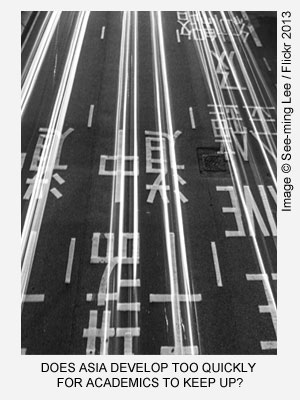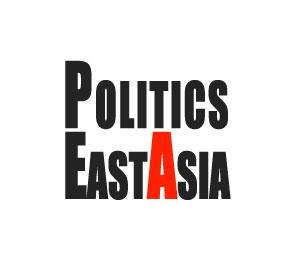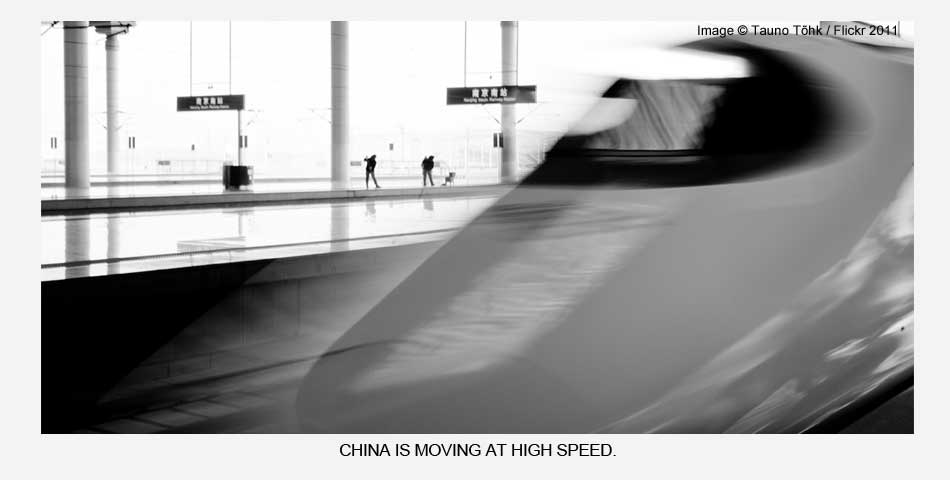Are scholars too slow for Asia?
What academics and bloggers can learn from each other
Over the past weeks, the Modern East Asia Research Centre (MEARC) hosted a series of events that were meant to increase cooperation between scholars and practitioners. Building a bridge between these two groups can be challenging, and the four organizers (the Clingendael Institute, Leiden University, the Dutch Ministry of Foreign Affairs, and MEARC) did an impressive job throughout to create spaces for engaging in collegial discussions. If you are interested in an overview, Manya Koetse has live-blogged from the conference “The Chinese Media and Relations with Europe”, Dirk Nimmegeers has covered the event in Dutch, and various impressions from the conference and its related events are available on Twitter, under the hashtags #CNmediaEU and #MEARC.
What I want to discuss in this post is a comment by one of our Chinese colleagues, a journalist and blogger, who summarized what is arguably a perennial source of frustration for many who work on East Asia: with the region changing so rapidly, academics seem too removed from the realities on the ground to be able to contribute to ongoing debates about current affairs. As this colleague suggested, academics would be well advised to consult bloggers and citizen journalists in order to learn about the changing situation in this highly dynamic region.
Can scholars keep up with bloggers?
Like many of my colleagues in academia, I sympathize with these concerns, and am very much in favour of increased two-way exchange between academia and the public. In fact, most institutions that fund research today require us to actively create opportunities for “research valorisation” – in other words, to openly exchange ideas regarding our work. This website, for instance, is precisely such an attempt.  Nevertheless, the questions that academics ask may at times seem removed from reality. What is worse, the fact that peer-reviewing and publishing processes work so slowly can make it seem as though the newest academic articles and monographs are always already outdated by the time they hit the library shelves. This seems particularly true for Asia, where the drive for modernization can seem breath-taking.
Nevertheless, the questions that academics ask may at times seem removed from reality. What is worse, the fact that peer-reviewing and publishing processes work so slowly can make it seem as though the newest academic articles and monographs are always already outdated by the time they hit the library shelves. This seems particularly true for Asia, where the drive for modernization can seem breath-taking.
Does this then mean that the critics are right? Is academic work on contemporary Asia ineffective? I don’t believe it is, and I think the problem lies with a misconception: that quick, concise explanations of current affairs are sufficient to understand complex societies today. While such “short-range theorizing” is a useful way to report on daily affairs, it is not always the best way to get purchase on the detailed and often messy “big picture”. Let me give an example from China that also came up during our conference: the recent ban on American TV series in Chinese online video services.
Popular accounts of Chinese censorship
In April, the administration responsible for television and broadcasting in the PRC ordered that popular programmes like The Big Bang Theory be removed from Chinese video-sharing websites. As so often with specific censorship decisions in China, the authorities provided only a very vague justification for this action, stating that the programmes had been in violation of the PRC’s content regulations. Speculation has since been ripe as to what drove the state agency to make such a decision. A highly popular argument, and one that was also reiterated at our conference, is that that the authorities are primarily concerned with ideological issues. In this view, the Chinese leadership found the “foreign values” in these programmes offensive, and as an overreaction to this perceived “spiritual pollution”, it consequently pulled the American series. This move is then often linked to the recent clampdown on social media under Xi Jinping. Since Xi took power last year, the government has continuously stepped up its controls of the Internet and of social media, and the recent TV series ban tends to be interpreted in this context.
It is not that such explanations are without merit. They are attractive because they capture specific observations and recurring concerns. For instance, the CCP has a tradition of eschewing perceived sources of “spiritual pollution”, and of making foreign influences responsible for social and moral problems in China. It is plausible that some cadres view hedonistic American TV as a bad influence. Nevertheless, such an explanation remains unsatisfactory because it is not able to account for the full complexity of the issue. Why, for example, would the Chinese leadership ban an innocuous sitcom like The Big Bang Theory but not the much more controversial series House of Cards? Why would it allow the central state broadcaster CCTV to air Game of Thrones, which even in its officially approved (read: strongly censored) version tells scathing tales of power struggle? These developments don’t seem to fit well with the idea that the censors are worried about foreign influences corrupting Chinese morality, or that the ban can be explained as part of the Xi administration’s struggle to retain control over public discourse.
Why the simple explanations aren’t necessarily the best
There are two reasons why these explanations fall flat. The first is that they are already grounded in a very strong moral judgment. That judgment seems to be that any authoritarian leadership must be inherently illegitimate and unstable, which must mean that the members of that leadership are first and foremost concerned about losing power to a contentious public. The actions of those leaders are then explained with that motivation in mind: American pop-culture becomes threatening to one-party rule.
Such premature judgment, however, is ill advised, as scholars of political legitimacy have repeatedly pointed out (cf. Schubert 2008): it closes off the uncomfortable possibility that political actors may very well have benevolent intentions, regardless of whether we find their actions and the political outcomes morally praiseworthy or not. Suspending judgement is always hard, but that is precisely why the lengthy process of academic research is helpful: it pushes scholars to take the time to re-think, to consider feedback from their peers, to rework their cases from different angles, and to (ideally) present a balanced, non-partisan view of their subject.
The second reason why the quick explanations are not always the best is that they often link their case to the personalities and biographies of specific leaders, or to the interests of particular political groups. Xi Jinping, as one of our conference presenters argued, is sanitizing public culture because he sympathizes with the kinds of cultural controls he grew up with during the Mao-era. Regardless of whether this assessment of Xi’s personal preferences is accurate (I have my doubts), such a view ignores that politics relies on two components: on the one hand the individuals and groups that take action (what social scientists call “agency”), and on the other hand the socio-historical constraints that affect how these people act (the “structure” of a society).
For example, it would be difficult to explain US foreign policy without looking at the people who are responsible for the major decisions. The individuals in the Bush administration clearly had very different personalities and preferences than the people who make up the Obama administration, and these differences affect political outcomes. However, individual decisions don’t play out in a social and historical vacuum. Checks-and-balances, economic pressures, expectations from voters, legal codes, unquestioned beliefs and assumptions – these are all structural issues that shape how actors behave in America’s political system. Looking only at one of the two dimensions of politics would be misleading.
Structure and agency: getting the mix right
Let’s return to the example from China and see what an explanation that includes structural issues might have to offer. In the case of the banned US television series, it helps to look at the complex political economy of China’s broadcasting industry. As media scholar Zhao Yuezhi (1998, 2008) has pointed out, media controls in China are not only about the “party-line”, but also about the “bottom-line”. The industry is dominated by state-owned enterprises, such as the TV stations and many of the large production companies, and assuring that these SOEs remain financially successful is a major political priority (Schneider 2012; Zhang 2011). Zhu Ying has shown how this rationale informs the recent online ban of foreign programming: one of the reason that The Big Bang Theory is no longer available on Chinese video-streaming websites is that the national state broadcaster CCTV has bought this and other foreign programmes and is hoping to maximize its advertising profits. Getting rid of the online competition promises to raise ratings and increase advertising revenues. As Adam Minter puts it, “China’s privately owned video streaming sites are stealing eyeballs and advertising dollars away from state-owned networks”. Of course, the centrally broadcast TV content will now also be censored, but to the state stakeholders this is a beneficial side-effect, not the main reason for banning online programmes.
As this example shows, censorship decisions in China are the result of complex interactions in a large political economy. Reducing them to the perceived preferences of China’s top leadership, and emphasising their novelty and newsworthiness, obscures that media controls in China encompass a range of continuously evolving polices that play out in a social, historical, and cultural context.
It is examples like these that show why it is so important for practitioners and academics to work together. Bloggers, citizen journalists, diplomats, and entrepreneurs tend to be very good at following the actors behind the polices on a day-to-day basis, figuring out what makes these individuals tick, and maintaining personal networks that allow precious insights into how specific decisions get made. However, that is only part of the picture. What academics bring to the table, is the structural side of the story: historical continuities, social pressures, economic dynamics, intersubjective relations. I would urge caution before discarding these parts of the story simply because they seem too “slow”. There is value in hitting pause, zooming out, and putting the recent current affairs developments into perspective.
References
Schneider, Florian (2012), Visual Political Communication in Popular Chinese Television Series. Leiden & Boston: Brill.
Schubert, Gunther (2008), “One-Party Rule and the Question of Legitimacy in Contemporary China.” Journal of Contemporary China 17/54, February: 191–204.
Zhao, Yuezhi (1998), Media, Market, and Democracy in China – Between the Party Line and the Bottom Line. Urbana and Chicago: University of Illinois Press.
Zhao, Yuezhi (2008), Communication in China – Political Economy, Power, and Conflict. Lanham et al.: Rowman & Littlefield.
Zhang, Xiaoling (2011), The Transformation of Political Communication in China – From Propaganda to Hegemony. Singapore et al.: World Scientific.
Share This Post, Choose Your Platform!
6 Comments
Comments are closed.



[…] Are scholars too removed from the realities on the ground to be able to contribute to ongoing debates about current affairs in a dynamic region like Asia? from China Studies at Leiden University http://www.politicseastasia.com/research/scholars-too-slow-for-asia/ […]
A call for ‘deeper’, below-the-surface, and as neutral as humanly possible knowledge. Perhaps not specific to the east-asia region, but usefull nonetheless. Same (sometimes!) applies to government sector: “we need an analysis of event X by 1500hrs”.
Thanks for the comment, and yes: I agree – speed can be a general challenge, not just in relation to East Asia. As much as being concise and on top of the issues is important, there are risks in the 100-word executive policy summary that was meant to arrive yesterday…
You cherrypicked this example, because it suits the narrative of academics “nuancing” china’s repressive policies.did you notice that in your piece you glancingly implied that a strong moral judgement is not academic? Where did you get this idea ? It makes me think of a young female researcher at clingendael last week who said that she separates her personal views from her research. This is naieve, but also, worse, amateuristic. Every (reseacchoice you make is ultimately informed by morality.it is not a very hip, liberal thing to say, but I think it is the honest analysis.
In the case of academia and china, it is my opinion that there is also an honest analysis that few have the freedom to express:(when you invest years of your life writing and learning the characters, you’re not going to say after 5 years: “hey, there are a lot of things wrong in this country I’m studying, and as an honest intellectual and (!) free citizen, I have the responsibility to speak up about that.” No, what many academics will do, is put themselves in all sorts of intellectual contortions to justify the fact that they are not speaking up about it.real debate, real disagreement happens in business, it happens in policy circles ( behind closed doors, not in front of the public), it happens on the internet. In academia, it’s just not accepted to really take a stand on things.this highly opportunistic attitude is then conflated with professionalism.besides being really uniformative compared to previously mentioned environments where actual debate does happen, it is also quite boring.
Thank you for sharing your views. I am sorry to hear you have such a low opinion of academics, and I’d be very interested to hear what you are basing that assessment on. In my experience, my colleagues working on China are hardly apologists, and most certainly not naive. We all have our opinions, some of them quite strong, but it is our job to look just as critically at our own position in research as at the subject of our work. This, I believe, is also what Dr. Stockmann meant – the researcher you probably have in mind from the conference (she’s at Leiden Uni, not at Clingendael, though). I’m sure she’d be more than happy to debate her views with you if you got in touch. I for one can recommend her recent book, which in my opinion is an excellent example of what a careful, balanced analysis looks like: http://amzn.to/1gy0FUQ